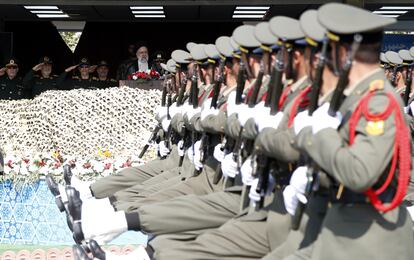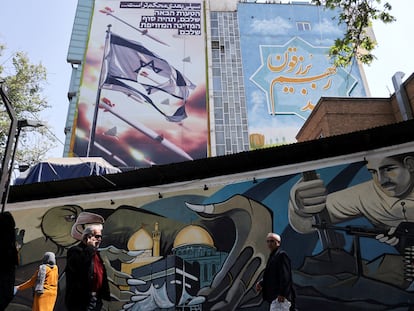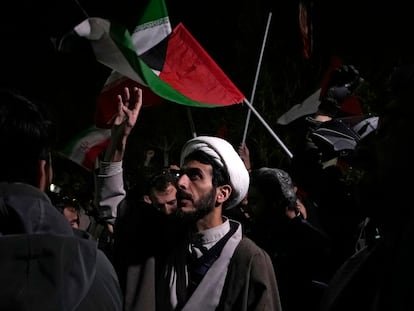Specter of war with Israel threatens to worsen poverty and repression in Iran
Critics of the Islamic regime fear that a conflict will deepen the serious economic situation, with skyrocketing inflation and corruption that especially affects the Revolutionary Guard

The Persian New Year begins with the arrival of spring. When the last year came to an end in March, inflation in Iran was at 63.9%, according to the country’s central bank. The cost of food was up 145%, according to information from the Iranian Statistics Center collected by Tejarat News. Rising inflation is pushing poor Iranians into misery and the middle classes into poverty. On Saturday night, when the official media began broadcasting the military strike against Israel, hundreds of supporters of the Islamic Republic of Iran showed their jubilation in the streets, according to photographs released by the official propaganda team. Other Iranians were alarmed by the news, fearing that it was a prelude to more destitution and more repression.
A letter signed by 350 Iranian activists in exile warned on Tuesday that “warmongering” in Iran could lead to “increasing repression of protest movements.” While the media focus remains on Israel’s possible response, Iran has mass deployed morality police to the streets to arrest women who are not wearing the compulsory hijab. Several journalists and three media outlets that criticized Iran’s attack against Israel, Jahan Sanat, Etemad and Eskan News, have been denounced by the Prosecutor’s Office, according to the Spanish new agency EFE.
One of the Iranians who does not share the official war ardor — a university student who prefers to remain anonymous for security reasons — believes that “the people of Iran do not support an attack on any country.” He argues that the celebrations on the street following Iran’s attack were orchestrated by the regime, the Revolutionary Guard, which commanded the attack, and the Basij militia. The university student warns that for Iranians “the consequences of the war would be destruction, economic problems, famine and internal repression.” His statements, like the other two cited in this report, were communicated in writing to EL PAÍS via the activist Ryma Sheermohammadi.
The university student, who combines his studies with work, says that his family “barely covers their minimum needs” and have less and less basic food products. “Iranians know what war brings: Iran has already experienced eight years of conflict, which caused a catastrophic economic situation,” he adds, alluding to the conflict between Iran and Iraq, between 1980 and 1988.
The population’s concern about the consequences of a war escalation was evident in the early hours of Sunday, according to this university student. While some Iranians went out to celebrate the attack, many others rushed to “stores and gas stations” to stock up on gasoline and supplies, he explains. Another Iranian, a man in his thirties, also mentioned the “long lines” at gas stations. This man says the country’s middle class “is getting poorer day after day.”
In January 2023, the country’s Ministry of Labor and Social Welfare released a report which indicated that one third of the Iranian population was now living in extreme poverty. In one year, between 2020 and 2021, the number of people living in poverty in Iran doubled — a problem authorities have blamed on the sanctions the international community has placed on Iran due to its nuclear program. Some experts also blame the rising levels of poverty on the corruption within the regime, an issue that is particularly problematic in Iran’s Revolutionary Guard, which controls a large part of the national economy.
According to an architect from Iran, “more than the war itself, which provokes jokes,” Iranians fear “its consequences on their livelihoods.” This professional describes how the sanctions against the regime have already “cast a shadow on the lives of Iranians, sometimes more than the government itself.” The United States, the United Kingdom, the G-7 and the European Union are considering applying new sanctions on Iran in response to its attack against Israel.
An unpopular force
The Iranian attack on Israel was in retaliation for the bombing of the Iranian consulate in Damascus on April 1, in which a Revolutionary Guard general, Mohammad Reza Zahedi, and six of his collaborators were killed. On April 7, Iranian authorities asked the public at a soccer match in the Azadi state of Tehran for a minute of silence. The response was an uproar of trumpet horns, shouts and howls.
Azadi stadium, Tehran, #Iran: Spectators were asked to observe a moment of silence for the IRGC commanders killed in Syria - The spectators, in turn, mocked them with boos and horns. pic.twitter.com/FhrAjHhVmB
— Breaking News (@TheNewsTrending) April 8, 2024
This reaction highlighted the public’s rejection to a body the university student defines as the “protector of the government and its repressive ideology, not as a national institution.” One figure that demonstrates the gap between Iranian people and the country’s institutions is voter turnout. In the last legislative elections, on March 1, only 41% of the electorate voted, while 5% cast null votes, according to official figures, received with skepticism by the opposition. The Islamic Republic of Iran used to have strong voter turnout figures, with figures as high as more than 70% and broad popular support.
The student who responded to EL PAÍS maintains that the Revolutionary Guard’s “bloody repression, torture and imprisonment of citizens in any protest” are the reasons why it is so unpopular. In the latest demonstrations against the regime, the Revolutionary Guard and its Basij militia were behind most of the more than 500 deaths due to the repression, according to the United Nations. These protests erupted on September 16, 2022, in response to the death in police custody of Mahsa Amini, a young woman who had been detained for opposing the mandatory hijab.
The Revolutionary Guard is also responsible for supporting Iran’s regional allies with money, weapons and training: Hezbollah in Lebanon, pro-Iran militias in Iraq and Syria, the Houthis in Yemen and Hamas in Gaza.
“Our money is spent on the warmongering of the Revolutionary Guard and the government, and on military equipment. And that causes the death of people in Syria, Lebanon and Gaza,” says the student. The architect adds that this force has cost the Iranians “more than it has benefited them because of their support for terrorist groups and allies [of the regime] in the region.”
One of the slogans chanted at any official event in Iran is “Death to Israel.” The paradox is that some Iranians are sympathetic towards Israel. In some cases, it is because they oppose the official discourse. In others, it is because Iran was the home of the largest Jewish minority in the Middle East for centuries: more than 100,000 people, of which about 25,000 remain. The architect says that Iranians have “no problem towards Israel.” But, he says, “Israel violates human rights.”
Sign up for our weekly newsletter to get more English-language news coverage from EL PAÍS USA Edition









































